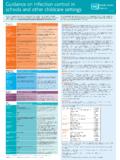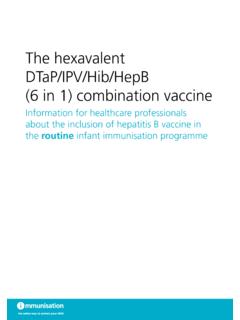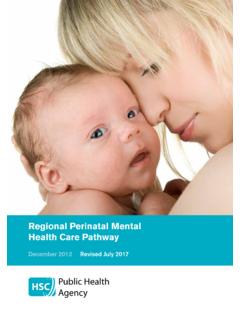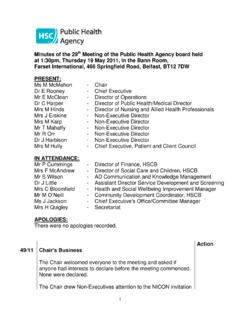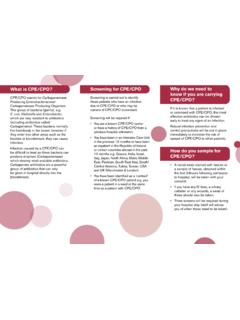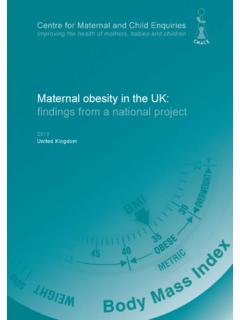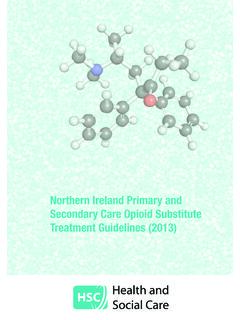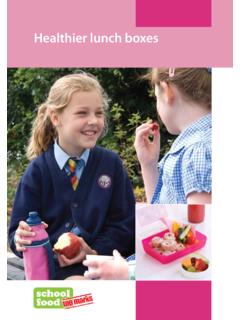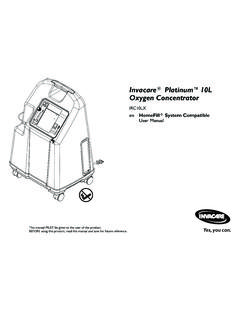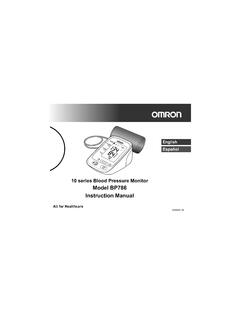Transcription of Nutrition matters for the early years - Health and Social Care
1 Nutrition matters for the early years Guidance for feeding under fives in the childcare setting23 What we eat can play a critical role in determining our Health , whatever our age. The eating patterns established in the first few years of life influence our Health during childhood and adulthood. Encouraging good Nutrition during the early years of life is therefore an investment in the Health of our population for years to more parents working, increasing numbers of children are spending long periods of time in childcare outside their own homes. This has implications for their dietary intake, as a large proportion of meals and snacks is now eaten away from home.
2 Childminders and the staff in nurseries and playgroups therefore have a crucial role to play in promoting healthy Nutrition among young publication outlines straightforward practical advice and information on a range of nutritional issues relating to children up to the age of five, based on current government guidelines. Information about the importance of encouraging physical activity and ensuring the safe handling and storage of food is also included. Nutrition matters for the early years is a valuable resource for all staff within day nurseries, playgroups and cr ches and for childminders providing childcare within the home setting.
3 Introduction 4 Page Why good Nutrition is important 6 A guide to weaning 8 - Foods to avoid giving to babies ..8- Weaning before six months ..10 - Weaning: from 6 months ..11- Weaning: from about 7 months ..12- Weaning: from 9 months ..13- Drinks for babies up to 12 months old ..14 A varied balanced diet for children aged one to five 15 - Potatoes, bread, rice, pasta and other starchy carbohydrates ..17- Fruit and vegetables ..19- Dairy and alternatives ..21- Beans, pulses, fish, eggs, meat and other proteins ..23- Oils and spreads and foods high in fat, salt and sugars ..25 Planning meals and snacks for children 26 - Meal and snack suggestions.
4 27- Sample menu for a full day ..31 Children with individual dietary needs 32 - Children following a vegetarian diet ..32- Children from ethnic communities following a traditional diet ..33- Children with special dietary needs ..33- Fussy Food safety 35 Rewards and celebrations 36 - Encouraging good behaviour ..36 Physical activity for children 37 Preparing a Nutrition policy 39 Nutrition checklist 41 Contacts for more information 45 Contents 5 Why good Nutrition is important 6 Good Nutrition is essential during childhood, as it is a time of rapid growth, development and activity. This is also a vital time for healthy tooth development and prevention of decay.
5 General eating habits and patterns are formed in the first few years of life. Poor Nutrition during these years is associated with an increased risk of obesity, hypertension, diabetes and coronary heart disease. Childcare providers therefore have a key role to play in introducing children to a wide variety of foods and establishing a pattern of regular meals and healthy arrangements for children s meals and snacks will of course vary considerably between different childcare providers. Some nurseries and childminders may provide all meals, snacks and drinks. This document offers them straightforward guidelines on how to ensure they are giving the children in their care a healthy diet.
6 In other cases, where parents provide drinks and snacks, or all foods and drinks for their child, childcare providers can use the document to help in any discussions they may have with parents about the food that they are providing food for young children, consideration must be given to the following points: Children s appetites may vary, not only from day to day, but also from one meal to the next. Young children are very active and have high energy (calorie) and nutrient needs in proportion to their small body size. Children have smaller stomachs than adults so it is important to consider portion size when plating food.
7 Every day, children need three meals plus snacks. Use the ideas given in this document to provide nutritious meals and snacks. Children should be encouraged to drink adequate amounts of fluids. A frequent intake of sugar and sugary foods and drinks between meals causes tooth decay. Snacks and drinks taken between meals should be sugar-free. Foods and drinks containing sugar should only be given occasionally and should be limited to mealtimes. Sugar may also appear on labels as sucrose, glucose, syrup, fructose or dextrose. Puddings should be nutritious and based on milk and/or fruit (fresh, stewed or tinned).
8 Avoid low fat or diet products, as young children need the extra calories from fat to grow and develop properly. Full fat spreads and whole milk dairy products are recommended. A diet high in fibre is not suitable for young children. It can fill them up without providing all the nutrients they require. Foods of varying fibre content should be offered, eg both white and wholemeal breads and pasta; a variety of breakfast cereals, eg Corn Flakes, Rice Krispies, Weetabix, porridge, etc. Children between the ages of two and five should gradually be encouraged to increase their intake of higher fibre foods. Dry, unprocessed bran should never be used as it can reduce the absorption of important nutrients and can cause bloating, wind and loss of appetite.
9 Do not add salt to food either in cooking or at the table, as babies kidneys are not fully developed. Too much salt is linked with high blood pressure later in life and may encourage a preference for salty food, which is difficult to change. Salty snacks such as crisps should be avoided for babies and young children, and given only very occasionally for older children. Whole nuts are unsuitable for children under the age of five years because of the risk of choking. It is recommended that peanuts and products containing them, eg peanut butter, are not provided within the childcare setting. This is to protect children who may be at risk of nut allergy.
10 It is recommended that grapes and cherry tomatoes are sliced or halved lengthways or prevent A guide to weaning All the nourishment a baby needs during the first six months comes from either breastmilk or infant formula milk. Based on current research, Health experts recommend that babies should begin to take solid foods from six months in addition to breastmilk (or the baby s usual formula milk) to allow them to grow and develop. This process is called weaning (sometimes referred to as complementary feeding). Solid foods should be offered initially 2 3 times a day, increasing to 3 4 times daily between 9 11 before six months is not recommended as babies digestive systems and kidneys are still developing.
